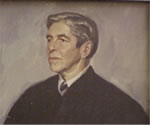Personal legal papers on the Chicago Seven contempt trial and other well-known cases heard by a Maine jurist, often cited as one of the nation’s most gifted federal judges, are now available to legal scholars, students and historians with the opening of the Gignoux Special Collections and Rare Book Room at the University of Maine School of Law. Edward T. Gignoux, was a U.S. District Court Judge who presided over numerous high-profile cases and was twice considered for nomination to the U.S. Supreme Court.
Judge Gignoux, a Maine native, presided at the Indian Lands Claim case and at the bribery-conspiracy trial of U.S. District Judge Alcee Hastings in Miami. He gained national attention in 1973 when U.S. Chief Justice Warren Burger appointed him to hear the contempt trial of Abby Hoffman, Tom Hayden and the other 1960s activists known as the Chicago Seven who were charged with conspiracy to disrupt at the 1968 Democratic Convention in Chicago. Gignoux earned his undergraduate degree from Harvard and his law degree from Harvard Law School before returning home to Portland to practice law. Gignoux was the youngest federal judge in the nation at the time of his appointment in 1957. He retired in 1983 but continued to hear cases as a senior judge. The federal courthouse in Portland was renamed the Edward Thaxter Gignoux United States Courthouse in September of 1988, just two months before his death. The Gignoux family gave the judge’s papers to the School of Law in the early 1990s.


